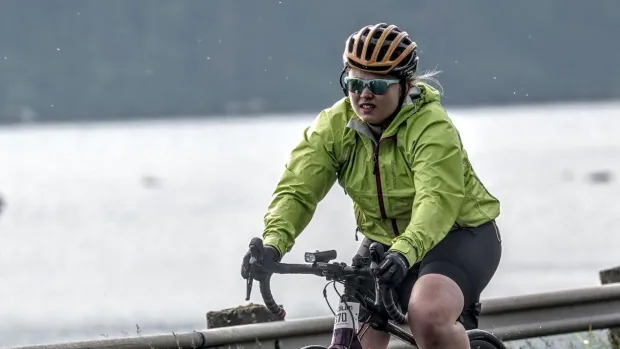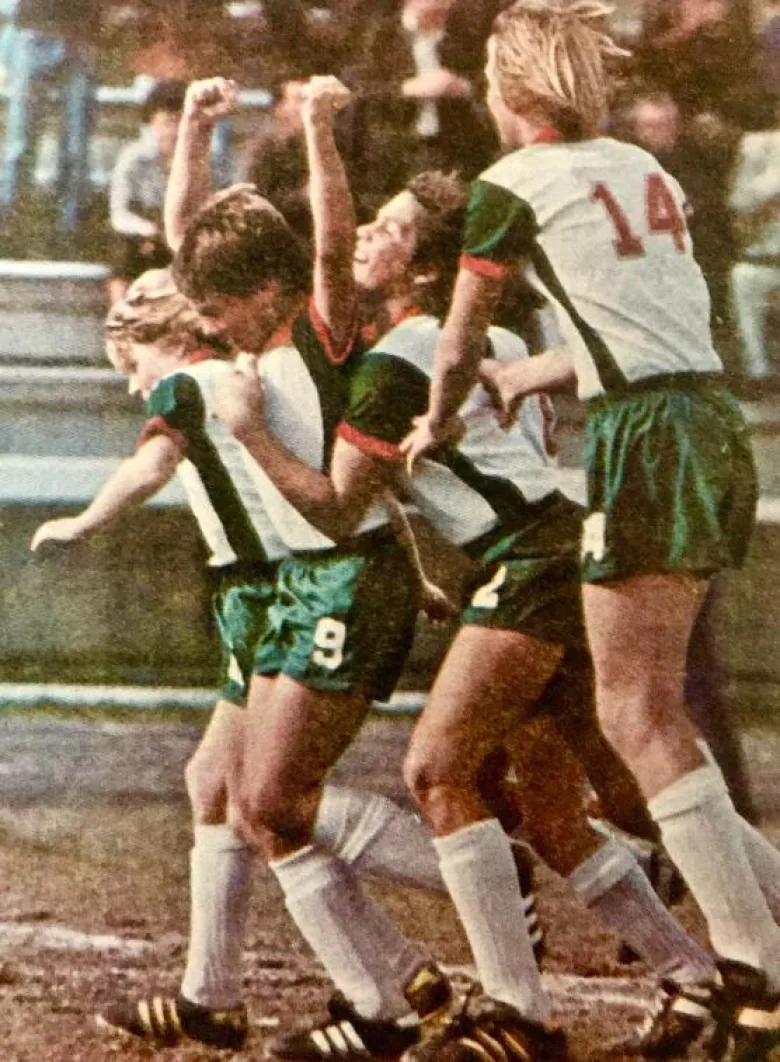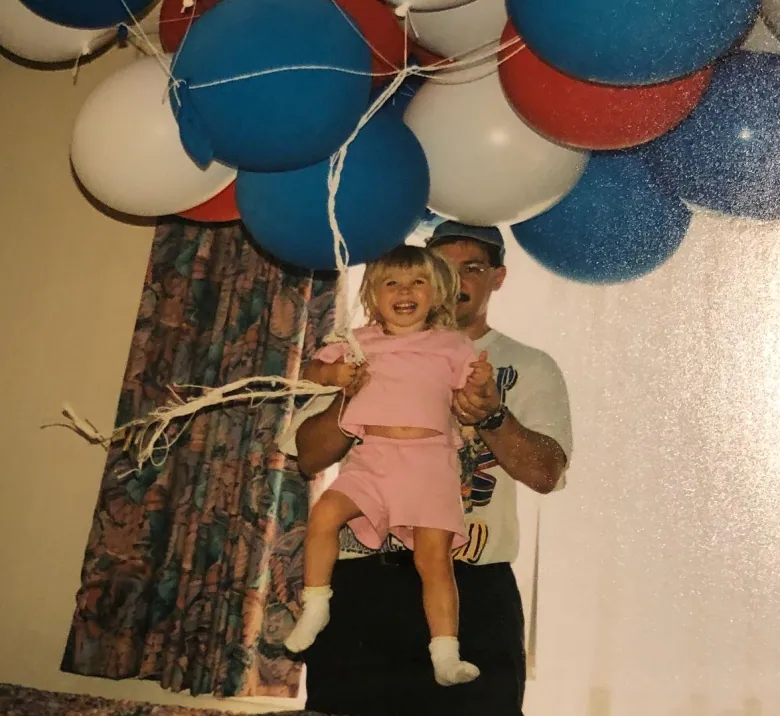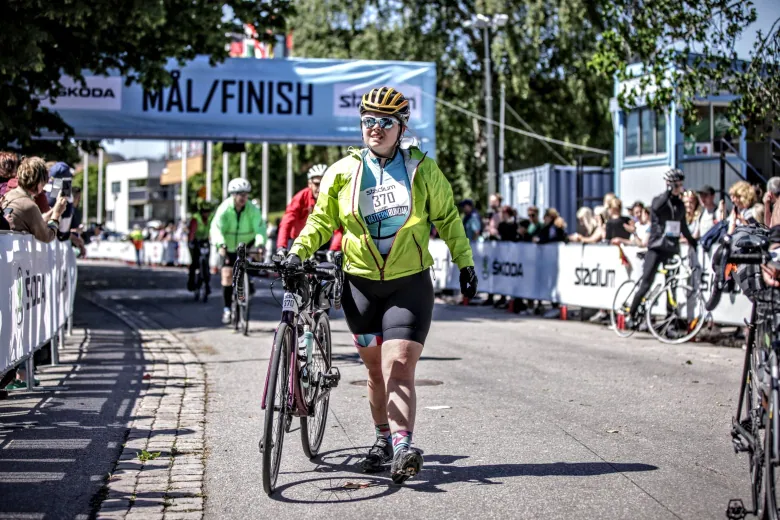
This First Person article is by Sophia Ersil who lives in Ottawa. For more information about CBC’s First Person stories, please see the FAQ.
It was midnight and I was biking through the darkness of the Swedish countryside. Through the raindrops, I saw red tail lights of other cyclists gliding up the hill ahead. I was cold and shivering and felt like giving up. As I somehow forced myself to pedal, I wondered if I had bitten off more than I could chew in signing up for the Vätternrundan, a 315-kilometre bike ride in Motala, Sweden.
What was I thinking? I wasn’t an athlete. Growing up, I never felt like I was fast enough or co-ordinated enough in sports. During soccer games, I sat on the ground picking dandelions instead of chasing the ball.
My younger sister was the athlete. She excelled in every sport, but gymnastics was where she shone. My dad built a special shelf to hang her medals and she quickly filled the entire wall.
I skated, danced, swam and ran just like her, but I never scored a winning goal or won a race. I watched from the sidelines as my teammates crashed the net or made the podium.
My dad and my sister were alike. When she started playing competitive soccer, they bonded over her new love of the sport and his memories of his glory days.
My dad was a second-generation Canadian. His parents fled the Second World War and the Iron Curtain in Europe, and they met in Canada. They instilled a strong work ethic and an intense competitiveness in their five children. My Opa never let his sons — or anyone else — win in table tennis.
I see that same competitive streak in my dad. He was a striker, and in 1978, my dad scored the winning goal at the Canadian Championships for the Oshawa Turul Soccer Club.

Years of not letting sprained ankles heal finally took their toll, and my dad gave up his dream of becoming a professional soccer player and eventually became a dentist.
My dad wanted his kids to try all of the sports he couldn’t afford to do growing up. He wanted us to be able to swim, ride a bike, skate, ski and see the world. He practised with us and in doing so he became a better swimmer, skater and skier.
My dad was also brutally honest. If he didn’t think we were good at something, he would tell us. It came from a place of love; I was bullied a lot as a kid and I think my dad didn’t want me to embarrass myself. But win or lose, my dad was our biggest supporter and fan. He went to every practice, game or competition we were in and cheered from the front row.
My dad was honest with me about my athletic abilities. He knew I would never stand on a podium because I wasn’t skilled enough or fast enough. When I told him I was going to try out for my high school and later university swim team, he told me it was a bad idea. But I did it anyway because I wanted to prove him wrong.
When I made the teams, he came to every swim meet. He even woke up at 4 a.m. to make the five-hour drive up from Milverton to Sudbury, Ont., to watch me swim at divisionals. I finished last in my heats, but Dad was proud of me.
Despite this, I always thought my dad never saw me as an athlete because I wasn’t as athletically gifted as my sister.
Cycling was one of my dad’s passions and he did rides across Ontario and internationally. When I was 17, we did a 70-kilometre charity ride in Ottawa to raise money for kids with cancer. As we rode, he told me about all the bike rides he wanted to do with me next. But that was the first and last time I rode with him.
Dad was training for his fifth Vätternrundan when he died unexpectedly of a heart attack in 2020.
When I returned home for his funeral, I found a pile of job postings for all the summer co-op jobs I had sent him lying on the kitchen table. A few days after his funeral, I interviewed for one of those jobs. He never got to see what I would achieve next — I got that job, and the next year, I made the dean’s list.
But even if he couldn’t cheer me on, I wanted to honour him. So I decided to finish what he started even though I felt woefully underprepared to finish the Vätternrundan.
I got my first road bike and cycling shoes at my dad’s favourite bike shop in Stratford, Ont.
My uncle Ed, my dad’s older brother and best friend, helped me to train.
He had spent hours riding and racing my dad. My dad was always competing with him and would push him to ride farther and faster. After my dad died, uncle Ed stopped cycling.
Biking was therapy for both of us. During our rides, I learned more about the life my dad had outside of being my dad. I listened to stories of their cycling adventures, of being chased by dog packs on country roads, changing tires in the pouring rain and my dad dropping Ed to catch up with faster cyclists.

I spent two years training but never rode farther than 150 kilometres, which is less than half the distance of the Vätternrundan. I definitely didn’t think I had it in me as I flew to Sweden alongside my dad’s long-time cycling partners and best friends.
But on that June evening, I was at the start line for the ride.
As I rode out of town, I took my dad’s place in our peloton. I was in the middle — where my dad rode for years.
And that’s how I found myself soaked and shivering at midnight in a ride I didn’t think I could ever complete.
With 70 kilometres left in the ride, I developed runner’s knee, and every pedal stroke left me in so much pain that I couldn’t stop crying.

Despite the pain, I kept pedalling and somehow made it to the end. I had the wind behind me pushing me forward; I felt like my dad was pushing me to finish.
It was like my dad was beside me as I crossed the finish line in 17 hours and 40 minutes. I was a lot slower than my dad’s record of 12 hours, but I’d done it for him — and me — and I felt a weight lift off my shoulders.
Do you have a compelling personal story that can bring understanding or help others? We want to hear from you. Here’s more info on how to pitch to us.

